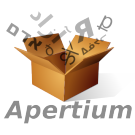New automatic translator from French to Esperanto Posted by Chuck Smith on Mar 10, 2011 in internet
Just last month, another automatic translator from French to Esperanto was published at apertium.saluton.dk. Before this, you could already use Apertium to translate from Catalan, English and Spanish to Esperanto and from Esperanto to English. This translation service is based on Apertium – an open source project for creating automatic translations. All of Apertium’s Esperanto translators are based at saluton.dk, for your convenience. In total, Apertium offers automatic translations between 42 language pairs.
This is open source software, also using free open data. For example, the new French to Esperanto translator mostly uses the basic bilingual dictionary from the Reta Vortaro and that’s why there is a French-language equivalent for almost every word. The Apertium’s entire source code and language data and its translation systems can be downloaded for free from SourceForge.
Hopefully this launch will not only deliver an interesting new resource, but will also cause more people to become interested in the creation of more automatic translators or to help polish the ones already existing. One of Apertium’s greatest qualities, is that its structure allows non-experts of Computational Linguistics to develop translators which will give a satisfactory result. Besides that, Apertium is an open, university-run project, which makes it possible for students to receive funding, also when it comes to translation systems for Esperanto. For example, through the Google Summer of Code, Apertium has received nine $5000 (USD) stipends during the summer these past two years. This will likely happen again in just a few more weeks. Because Esperanto speakers are actively engaged in the project internally and Esperanto is highly-respected from within, it is quite possible to receive a stipend for creating another language pair for three months between Esperanto and another Indo-European language. Also, candidates will be able to get help from the Esperanto group at Apertium. On the other hand, non-students are also welcome to contribute to the project. If you’re interested in any way, just join the Apertium’s Esperanto mailing list or contact Hèctor Alòs i Font <hectoralos (at) gmail.com>.
Now, here is an example to try out the system for yourself: Translation from the French Wikipedia into Esperanto (original French). Here you can see the same article in the Esperanto Wikipedia. Jacob Nordfalk comments, “I have the impression this is a grand linguistic work, with much better results than my amateur attempt to make a translator from English.” You can also compare this same article from the English Wikipedia.
It is also worth mentioning WikiTrans by Eckhard Bick, an automatic translator for translating the English Wikipedia to Esperanto to help editors get a jump-start when translating articles. Here is that article translated from English with Wikitrans.
This blog post was loosely translated from a press release by Hèctor Alòs i Font.

Build vocabulary, practice pronunciation, and more with Transparent Language Online. Available anytime, anywhere, on any device.
About the Author: Chuck Smith
I was born in the US, but Esperanto has led me all over the world. I started teaching myself Esperanto on a whim in 2001, not knowing how it would change my life. The timing couldn’t have been better; around that same time I discovered Wikipedia in it’s very early stages and launched the Esperanto version. When I decided to backpack through Europe, I found Esperanto speakers to host me. These connections led me to the Esperanto Youth Organization in Rotterdam, where I worked for a year, using Esperanto as my primary language. Though in recent years I’ve moved on to other endeavors like iOS development, I remain deeply engrained in the Esperanto community, and love keeping you informed of the latest news. The best thing that came from learning Esperanto has been the opportunity to connect with fellow speakers around the globe, so feel free to join in the conversation with a comment! I am now the founder and CTO of the social app Amikumu.




